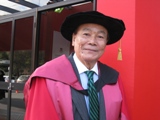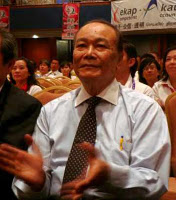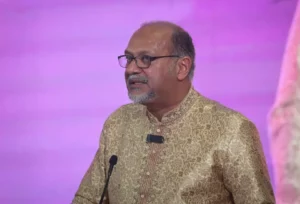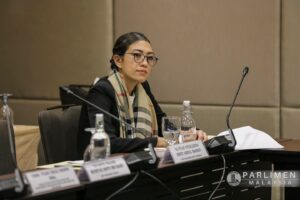
 The DAP shares the joy and honour of its National Vice Chairman, Senator Tunku Abdul Aziz Tunku Ibrahim, who has recently been conferred Degree of Doctor of Laws (honoris causa) by his Alma Mater, The University of Tasmania, Australia. The ceremony was held on 12 August in Hobart. Australia.
The DAP shares the joy and honour of its National Vice Chairman, Senator Tunku Abdul Aziz Tunku Ibrahim, who has recently been conferred Degree of Doctor of Laws (honoris causa) by his Alma Mater, The University of Tasmania, Australia. The ceremony was held on 12 August in Hobart. Australia.
The Provost, Professor Rich, presented the Degree to Senator Tunku Abdul Aziz for admission to the degree of Doctor of Laws and read the following citation (in part):
“As members of a democratic society all of us place high value on the principles of integrity, transparency and ethical conduct. We expect our politicians, business and community leaders to act according to these principles in their dealings with each other and with us. We also expect these principles exhibited in our day to day interactions with our peers and with government agencies and business.
“Most of us are dismayed when we see these cornerstones of our way of life eroded by self interest or corrupt conduct. Many of us are prepared to condemn infringements, but few of us are prepared to stand up in public forums and be counted – being critical where necessary and championing the importance of integrity, transparency, and ethical conduct in our dealings with one another.
“Tunku Aziz has made this his lifetime’s work and has campaigned fearlessly and relentlessly for good governance and ethical conduct in his fight against corruption.
“Tunku Aziz came to the University of Tasmania in 1962 graduating Bachelor of Arts with majors in History and Political Science in 1965. He joined many other young people from Australia’s South East Asian neighbours with the intent of later assuming leadership roles in their home countries. Tunku Aziz not only reached, but exceeded that expectation, achieving international prominence for championing, and driving to embed in all our dealings with one another, principles that good and upright people throughout the world hold dear to their hearts.
“In doing so Tunku Aziz has brought honour to himself, to his country, and to his University. It is, indeed, most fitting that his University should reciprocate by recognising his achievements through the conferral of the degree of Doctor of Laws honoris causa.”
Senator Tunku Abdul Aziz who hails from Kedah said that the award “was a shared honour with those who had laboured together with me to establish Transparency International Malaysia and to create widespread awareness of the debilitating effects on national life.”
Described by veteran politician and DAP Parliamentary Leader, Sdr Lim Kit Siang, as the “beacon of integrity”, Senator Tunku Abdul Aziz continues to play an important role in the nation’s struggle to bring about a clean and responsible governance.
“It is good to return to my old stamping ground, I am completely overwhelmed and humbled by the honour that has just been conferred upon me on this splendid occasion. This award means more to me than anything else that has come my way, because it is my university, after all, that has seen fit to recognise my small contribution to the fight against corruption both inside my country as well as in the wider world.
If anyone had suggested to me when I was a student here in the distant past, that one day, in this lovely city of Hobart of happy memory, the University of Tasmania Council would graciously admit me to the honorary degree of Doctor of Laws of this great university, I would have told them that I did not believe in miracles. Well, as you can see, I do now.
I should like to talk about integrity in professional life, and, by extension, national life. Ours is a world of few absolutes. However, integrity happens to be one of them. The thing about integrity is that you either have it or you don’t. There is nothing in between. You cannot grade integrity in the same way you would academic performance and allocate points or marks. What integrity does is that it defines our true worth, not in dollar terms as individuals. Integrity is no longer a luxury of the virtuous few; it has become life’s necessity.
In the vast majority of cases of corruption which we define as the abuse of entrusted power for personal gain, the most important single contributory factor is a failure to recognise a conflict of interest situation. In fact I am prepared to go so far as to suggest that a conflict of interest is the culprit in every reported case involving public servants, in particular.
In my time as Special Adviser to the UN Secretary-General on the Establishment of the Ethics Office in New York, I came across several cases of the great and good who were genuinely insensitive to the warning signs that they were getting themselves into untenable conflict of interest situations. Even Kofi Annan, that most honourable of men, needed some help in this respect.
Kofi Annan, as UN Secretary-General accepted half a million dollars, part of the Zayed International Prize for the Environment from the Emir of Dubai in 2006. Now listen to this carefully. The prize was awarded on the recommendation of a panel of judges comprising, in the main, top UN officials and others with close UN connections. Conflict of interest was written all over the cheque that was presented to the UN Secretary-General.
He thought he could use it to set up a foundation bearing his, and his wife’s, name to promote girls’ education and agricultural development in Africa. You could not fault the noble motivation, but, of course, there was everything wrong on at least two counts.
There was, first, a conflict of interest involved – the panel was packed with UN officials. And second, however noble his intentions might be for Africa, using the prize money to set up a foundation to be named after him and his wife was a serious error of judgement. What may be legally kosher is not always ethically right. I advised him to drop the idea before it became an embarrassment. Kofi Annan, man of integrity that he is, agreed at once and the money went to support UN peace keeping operations in Darfur instead. There was, of course, no suggestion that he was benefiting personally from this initiative.
I relate this little story by way of showing you how vitally important it is for people in positions of professional authority such as you will soon be, to learn quickly in your work to recognise a conflict of interest situation and to avoid it like the plague. So many reputations have been ruined because people have chosen to ignore a fundamental rule of integrity.
So whether you work in government, in a firm of auditors, in academia, you are a public servant in the wider sense of the word. The highest form of service is that which is performed in the public interest. There can be no greater satisfaction than knowing that you have discharged your duty honourably.”
__________________________________________________________________________________
Tunku Aziz founded the Malaysian Chapter of Transparency International. He was elected Vice-Chairman of the Board of Directors of Transparency International in 1998 to 2002. He was appointed, in Feb. 2006, Special Adviser to the Secretary General of the United Nations, and in that capacity set up the UN Ethics Office.



